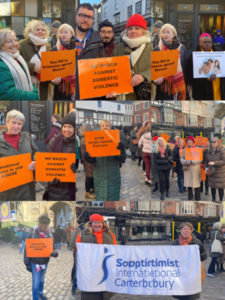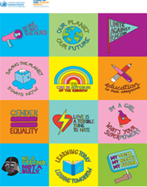On 10th December 2023, the world will commemorate the 75th anniversary of the Universal Declaration of Human Rights. The theme this year is “Dignity, Freedom and Justice for All”. When you consider all the troubles and injustices currently taking place throughout the world, this is such an appropriate theme.
10th December 1948, the United Nations General Assembly adopted the Universal Declaration of Human Rights (UDHR), to which all human beings are entitled regardless of race, colour, religion, sex language, political or other opinion, national or social original, property birth or other status. This document has been translated into more than 500 languages and is the most translated document in the world.
As Soroptimists, I believe it is important to note that there were some key women who shaped the Universal Declaration:
 Eleanor Roosevelt, first lady of the United States of America from 1933 to 1945 (pictured above), was appointed in 1946 by US President Harry S Truman as a delegate to the United Nations (UN) General Assembly. She served as the first Chairperson of the Commission on Human Rights and played an instrumental role in drafting the Declaration.
Eleanor Roosevelt, first lady of the United States of America from 1933 to 1945 (pictured above), was appointed in 1946 by US President Harry S Truman as a delegate to the United Nations (UN) General Assembly. She served as the first Chairperson of the Commission on Human Rights and played an instrumental role in drafting the Declaration.
Hansa Mehta of India, who was the only other female delegate to the United Nations Commission on Human Rights in 1947-48, is widely credited with changing the phrase “All men are born free and equal” to “All human beings are born free and equal” in Article 1 of the Universal Declaration of Human Rights. She was a staunch fighter for women’s rights in India and abroad.
To commemorate the 75th Anniversary of the Universal Declaration of Human Rights, the United Nations partnered with YAK (Yacine Ait Kaci), the French digital artist, whose illustrated character called Elyx is the first digital ambassador of the United Nations, to create an illustrated version of the 30 Articles of the Universal Declaration of Human Rights.
How can Soroptimists commemorate and support Human Rights Day?
There are many ways in which Soroptimists can and do support the thirty articles contained in the UDHR by carrying out project work in the following key areas:
- Commemorating and highlighting to non-Soroptimists the 16 Days of Activism Against Violence Women, whilst wearing the colour orange wherever possible throughout the 16 days. I am sure it is no coincidence that the 16 days end on Human Rights Day. SI Canterbury once again organised a silent march through the Streets of Canterbury this year to demonstrate against gender-based violence The march was supported not only by other Soroptimist clubs, but also members of the local council, the general public, and an increased number of men

- Lobbying for the rights of women who have been subjected to domestic abuse and supporting the UN Secretary General’s UNiTE Campaign to End Violence Against Women– Articles 1, 3, 5, 12 and 16
- Human trafficking and modern slavery – lobbying against this and working with organisations to support victims e.g., Human Trafficking Foundation, Medaille Trust, and others – Articles 1, 2, 3, 4, 5, 6.
- Working with foodbanks to end hunger – Article 25.1
- Supporting charities working with the homeless, to ensure they have adequate clothing, medical care, and access to social services – Article 25.1
- Supporting education for women and children by working with schools, colleges, etc. – Article 26
- Working with organisations such as the Prison Reform Trust to support women imprisoned because of their reactions to domestic abuse – Articles 6, 7, 8, 9, 10, 11 and 12.
- Lobbying for the right to work and for women to have equal pay to men for equal work and to have the right to work a reasonable limitation of working hours with periodic holidays with pay – Articles 23 and 24
 Some Soroptimist clubs work with their local schools on a range of educational initiatives and some have formed school clubs. An excellent introduction to human rights for school students is the Illustrated booklet of the Universal Declaration of Human Rights, which includes a foreword by former UN Secretary General, Ban Ki-moon, and introduction by former UN High Commissioner for Human Rights, Zeid Ra’ad Al Hussein. This booklet together with the stickers (pictured) and posters developed for 2019 could be used clubs wishing to run a workshop in a school.
Some Soroptimist clubs work with their local schools on a range of educational initiatives and some have formed school clubs. An excellent introduction to human rights for school students is the Illustrated booklet of the Universal Declaration of Human Rights, which includes a foreword by former UN Secretary General, Ban Ki-moon, and introduction by former UN High Commissioner for Human Rights, Zeid Ra’ad Al Hussein. This booklet together with the stickers (pictured) and posters developed for 2019 could be used clubs wishing to run a workshop in a school.
In conclusion, Human Rights Day is one of the most important days in the year which Soroptimists commemorate, as it so much in line with our aims and objectives to help those whose lives are adversely affected by a violation of their human rights.
Yvonne Freeman
SI Folkestone Club


